|
|
|
Sort Order |
|
|
|
Items / Page
|
|
|
|
|
|
|
| Srl | Item |
| 1 |
ID:
188068
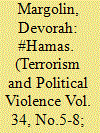

|
|
|
|
|
| Summary/Abstract |
As the debate on whether Hamas should be designated a terrorist organization intensifies across Europe and North America, policymakers and practitioners seek to identify the core principles that unify the group and its ideology. This paper contributes to this discussion by examining how Hamas uses Twitter to frame its narrative to English-speakers around the world. From March 2015 until November 2019, when its account was suspended from Twitter, Hamas operated an English-language Twitter handle under the name @HamasInfoEn. Using thematic content analysis to explore the first 2,848 tweets sent by Hamas in English—between March 2015 and March 2018—this paper explores the socio-political and religious narratives that lay at the core of Hamas’s online public diplomacy throughout its first three years on Twitter. Since its entrance into politics in 2006, some academics argue that Hamas has increasingly sought to distance itself from acts of terrorism and legitimize its actions as a governing actor, thereby seeking to carve out a place for itself in the international community. This study presents a nuanced understanding of how Hamas represents itself internationally, to better understand where the group is going, and how to best counter its narratives.
|
|
|
|
|
|
|
|
|
|
|
|
|
|
|
|
| 2 |
ID:
191865
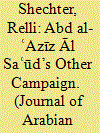

|
|
|
|
|
| Summary/Abstract |
This article focuses on the propaganda campaign that advisors to ʿAbd al-ʿAzīz Āl Saʿūd (“Ibn Saud”) –– emir, later sultan, of Najd and, later again, king of Najd and Hijaz, and finally king of Saudi Arabia –– engaged in between 1918 and 1932. It argues that this prolonged campaign was as crucial to the establishment of the state as the sultan’s military conquest of the land. I term this a “campaign” because it was a connected attempt, having constant, clear messages emphasising ʿAbd al-ʿAzīz’s positive leadership qualities, his reformist, modernising intent, and a positive representation of Wahhabism. It also disparaged his enemies and emphasised the natural unity of his recently conquered land. The campaign was central to persuading regional and global powers of the viability of ʿAbd al-ʿAzīz’s state-making project, and later, to gaining official diplomatic recognition of the Saudi state. The article studies this unfolding campaign through analysis of autobiographies, memoirs, travel and history books and articles written by ʿAbd al-ʿAzīz’s advisors; critical engagement with recent ample information on these advisors found on Saudi websites and in Saudi history books and the press; and US diplomatic correspondence.
|
|
|
|
|
|
|
|
|
|
|
|
|
|
|
|
| 3 |
ID:
186108
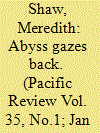

|
|
|
|
|
| Summary/Abstract |
This article examines the ways in which the North Korean regime filters and re-interprets various ‘messages’ from the outside world for its domestic audience through the lens of state-produced literature. In broad strokes, I identify three main types of foreign interactions purported to send a ‘message’ to North Korea – economic sanctions, summit diplomacy and military exercises/fleet movements – and examine how these are treated in North Korean fiction produced by the Korean Writer’s Union, an important arm of the Party’s Propaganda and Agitation Department. Each of the three interaction types represents a formal effort by an outside government – typically the United States or its allies – to send a message to the regime or its people and thereby shape their behavior and/or perception of the outside world. By examining how these ‘messages’ are portrayed in North Korean fiction, we can gain insight into how the regime shapes internal narratives about foreign affairs, as well as what sort of alternative narratives it is most anxious to intercept or disrupt.
|
|
|
|
|
|
|
|
|
|
|
|
|
|
|
|
| 4 |
ID:
183672
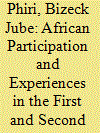

|
|
|
|
|
| Summary/Abstract |
Unlike existing studies that examined each of the two World Wars and Africans separately, this study explores African participation and experiences in the First and Second World Wars in Northern Rhodesia (colonial Zambia) together during the period, 1914–1948. A lot has been written on the history of the World Wars in colonial Africa. However, there is not much literature that focuses on African participation and experiences during the two world wars. This study is focused on the core theme, that is, the role played by Africans in both World Wars. This is the main theme that informs the study. The core theme is sub-divided into the following three sub-themes: the making of the Northern Rhodesia Police under the British South African Company, BSACo, a Chartered Company that prohibited by law from housing a standing; recruitment of personnel for the Northern Rhodesia Regiment; the role played by traditional authorities in the recruitment of ‘Askari’ – the Foot Soldiers and the ‘Tenga-Tenga’ War Carriers and the role of government propaganda while bringing to the fore African agency during both Wars. Also discussed in the study is the demobilisation process in which African servicemen – the Foot Soldiers and the ‘Tenga-Tenga’ War Carriers – felt cheated by an Empire-wide system of racial discrimination and hierarchy. Although an expanded government propaganda machinery contributed to the growth of an African political voice in Northern Rhodesia during the period, 1914–1948, that political voice neither included nor translated to much debate or discussion about the concerns of African ex-servicemen and their personal affairs. The study equally examines how their state of affairs affected the relationship between the ex-servicemen and their traditional leaders who were active in the recruitment process that brought them into the Wars in the first place. The study concludes with the re-examination of the older arguments that African servicemen did not play an active role in nationalist politics after the World Wars, and submits otherwise, that is, that they actually did.
|
|
|
|
|
|
|
|
|
|
|
|
|
|
|
|
| 5 |
ID:
072985
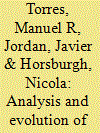

|
|
|
|
|
| Publication |
2006.
|
| Summary/Abstract |
The Global Jihadist Movement (GJM) has a series of well-defined objectives, which constitute the central points of their ideology. In the realization of these goals, propaganda and public communication play a central role. This article studies the evolution of the principal characteristics of GJM propaganda, analyzing over 2,000 documents issued by the GJM between 1996 and 2005.
|
|
|
|
|
|
|
|
|
|
|
|
|
|
|
|
| 6 |
ID:
190963
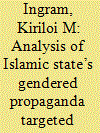

|
|
|
|
|
| Summary/Abstract |
This article analyses Islamic State’s English language propaganda targeting Western women and how that messaging changed as the group shifted from territorial control back into an insurgency. It argues that Islamic State leverages five female representations in its appeals to women in order to construct and project an alternative gender order designed to further the group’s strategic objectives. As those objectives changed, so did the nature of its appeals and the female representations its propaganda emphasised. Based on primary source analysis, it draws on fifteen issues of Dabiq which spans a period of success for the group when it controlled territories and population centres (July 2014 to July 2016) and thirteen issues of Rumiyah which was a period characterised by strategic decline back into an insurgency (September 2016 to September 2017).
|
|
|
|
|
|
|
|
|
|
|
|
|
|
|
|
| 7 |
ID:
177577
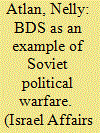

|
|
|
|
|
| Summary/Abstract |
This article seeks to underline the ideological filiation between the principles of Russian political warfare (disinformation, aggressive propaganda, manipulation, distortion, political isolation of the target (politicide), the anti-Zionist propaganda formulated by the Soviet Union and the BDS argument, conceived as a node around which anti-Israeli organisations and structure gravitate. To determine this filiation this article examines step by step; the principles of Russian political warfare; the development of that doctrine as expressed in the anti-Zionist propaganda formulated by the Soviet Union between 1897 and 1991 and finally the modalities of the application of the Russian political warfare in the BDS argument. The findings reveal a twin phenomenon of appropriation; first an appropriation of Russian political warfare as a strategy to delegitimise Israel and second, an appropriation of the arguments produced by the anti-Zionist propaganda formulated by the Soviet Union.
|
|
|
|
|
|
|
|
|
|
|
|
|
|
|
|
| 8 |
ID:
188375
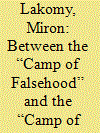

|
|
|
|
|
| Summary/Abstract |
This paper attempts to fill the gap in research and contribute to the academic debate on the online magazines of Daesh. Its primary objective is to identify and understand propaganda devices, which were exploited by the editors of “Dabiq” to influence its readers. In order to do this, the study utilized a classic framework of propaganda devices elaborated by the American Institute for Propaganda Analysis, which consists of seven methods: name-calling, glittering generalities, transfer, testimonial, card-stacking, plain folks, and bandwagon.
|
|
|
|
|
|
|
|
|
|
|
|
|
|
|
|
| 9 |
ID:
116342


|
|
|
|
|
| Publication |
2012.
|
| Summary/Abstract |
This article undertakes a descriptive analysis of the jihadist group, the Global Islamic Media Front. Using information obtained from cells broken up in the West, it argues that, in addition to its propaganda actions in support of terrorism, the group fulfils three additional functions: (a) It serves as an "identity refuge" for individuals wishing to cultivate an identity as fighters of the jihad; (b) It offers a form of "surrogate activism" to those who fail in their attempts to join organisations engaged in terrorist violence; and (c) It is an important source of violent radicalisation for its own members who become increasingly dissatisfied with their propaganda activities.
|
|
|
|
|
|
|
|
|
|
|
|
|
|
|
|
| 10 |
ID:
113992
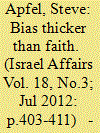

|
|
|
|
|
| Publication |
2012.
|
| Summary/Abstract |
There are several paradoxes in the propaganda war against Israel. The most puzzling of them perhaps would be the way many Christian groups and churches side with the Palestinians. On the evidence one would expect the opposite. Believing Christians have every logical reason to be pro-Israel, where alone in the Middle East Christendom's holy sites are protected; where Christians may pray openly; and where Christian followers face no pressures to convert. On the Palestinian side none of those freedoms exist. How in that case can one explain groups like the Presbyterians, the World Council of Churches, Christian Aid and so forth aiming their missiles at the Jewish state? Bringing together religious doctrine, life-preserving motives and naked bias, this article seeks to provide answers to the paradox of Christianity against Christian-friendly Israel.
|
|
|
|
|
|
|
|
|
|
|
|
|
|
|
|
| 11 |
ID:
139319
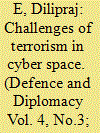

|
|
|
| 12 |
ID:
144541
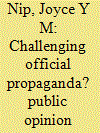

|
|
|
|
|
| Summary/Abstract |
This article examines the prominence of various user categories as opinion leaders, defined as initiators, agenda setters or disseminators, in 29 corruption cases exposed on Sina Weibo. It finds that ordinary citizens made up the largest category of initiators but that their power of opinion leadership was limited as they had to rely on media organizations to spread news about the cases. News organizations and online media were the main opinion leaders. Government and Party bodies initiated a fair number of cases and, despite not being strong agenda setters or disseminators, were able to dominate public opinion owing to the fact that news organizations and online media mainly published official announcements about the cases. Media organizations also played a secondary role as the voice of the people. While individuals from some other user categories were able to become prominent opinion leaders, news workers are likely to be the most promising user category to challenge official propaganda.
|
|
|
|
|
|
|
|
|
|
|
|
|
|
|
|
| 13 |
ID:
165875
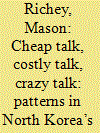

|
|
|
|
|
| Summary/Abstract |
This article examines the patterns in the Democratic People’s Republic of Korea’s (North Korea’s) use of hostile rhetoric in its internationally-directed messaging. The article first places North Korea’s belligerent rhetoric in the context of that country’s capacity to threaten the US and its Northeast Asian allies; indeed many analysts worry that Pyongyang’s rhetoric represents a conflict escalation risk or even a casus belli. Following this, the article discusses the common explanations – irrationality/incompetence, lack of audience costs, inter alia – for why the North Korean regime employs such hostile rhetoric, and finds these explanations wrong or misleading. The main analysis section describes the results of a study of 10 years of English-language propaganda published by the KCNA (North Korea’s state news agency). A multiple regression model is used to test the relationship between North Korea’s hostile rhetoric and a set of independent variables. The statistical tests indicate a mixed correlation of North Korean rhetoric to the independent variables. One major finding is that there is no correlation between hostile North Korean rhetoric and the country’s kinetic provocations. The conclusion discusses the role that North Korea’s rhetoric plays within the country’s larger adversarial relationship to the US, South Korea, and Japan.
|
|
|
|
|
|
|
|
|
|
|
|
|
|
|
|
| 14 |
ID:
173221
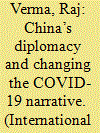

|
|
|
|
|
| Summary/Abstract |
The world has declared COVID-19 (a disease caused by the SARS-CoV-2 virus or novel coronavirus) to be a pandemic. China has been chastised by various countries, especially the United States, for suppressing information and not taking necessary measures which could have helped in controlling the spread of and/or eradicating the disease in the earlier stages. Consequently, China has undertaken numerous measures to change the COVID-19 narrative and disassociate itself from COVID-19. It launched a campaign to question the origins of SARS-CoV-2, blamed the United States for spreading COVID-19, claimed victory in combating COVID-19 domestically, and provided aid (“mask diplomacy”) to countries. These actions betray China’s concern about its image. The country wants to portray itself as a Good Samaritan, a responsible and reliable partner, and an essential global power. Additionally, China has grave concerns about regime stability and survival. President Xi’s legitimacy is built on technocratic competence. The outbreak has the potential to seriously dent his personal legacy.
|
|
|
|
|
|
|
|
|
|
|
|
|
|
|
|
| 15 |
ID:
106256
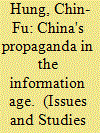

|
|
|
|
|
| Publication |
2011.
|
| Summary/Abstract |
Ever since the Mao era, propaganda has been the primary vehicle in China for the indoctrination and mass mobilization of citizens. In the last few years however, as China has continued to open up to the outside world and deepen its reforms, it has experienced an unprecedented boom and liberalization of its media sector. While the propaganda regime continues to attempt to guide and shape public opinion, the conventional propaganda apparatus is not as effective as it used to be. This has given rise to a new governing mechanism that employs Internet commentators to direct cyber discussions and create favorable online opinions about the party-state. Accordingly, this paper addresses the new phenomenon of Internet commentators and argues that the creation and increased utilization of such commentators has provided the Beijing governmentwith an up-to-date tool for disseminating and reinforcing party ideology and thought work in the information age. A case study of the Weng'an incident is discussed as a means through which to explore China's propaganda regime.
|
|
|
|
|
|
|
|
|
|
|
|
|
|
|
|
| 16 |
ID:
173004
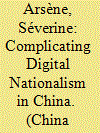

|
|
|
| 17 |
ID:
149172
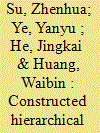

|
|
|
|
|
| Summary/Abstract |
The Chinese government has long enjoyed a higher level of popular trust in its central authority than in its local governments, which means that the Chinese public’s trust in government is hierarchical. While existing research has highlighted hierarchical trust’s role in issue_images_89_4_su-et-al_govt-trust-in-china-ea-image01bolstering the Chinese regime’s rule, the formation mechanism for such trust has not been adequately explored empirically. In this paper, we use data from the China General Social Survey (2010) to explore the formation mechanism of hierarchical government trust and find that economic development, adherence to traditional values, and high frequency of Internet usage all contribute to the decrease of hierarchical government trust. These findings challenge conventional views that cultural traditions and Internet use help sustain hierarchical government trust and show that propaganda is the only variable that sustains the pattern of hierarchical government trust. We further challenge existing literature that views hierarchical government trust as a natural outcome of China’s hierarchical administrative structure and empirically prove that such trust is in fact intentionally constructed by the central government through propaganda campaigns and an institutional design aimed at strengthening the central government’s authority and at guiding people to divert dissent to local governments. Our findings make an important contribution to the dialogue and highlight a new area of authoritarian durability.
|
|
|
|
|
|
|
|
|
|
|
|
|
|
|
|
| 18 |
ID:
182669


|
|
|
|
|
| Summary/Abstract |
Authoritarian regimes frequently attempt to justify repression by accusing their opponents of violent behavior. Are such claims successful at persuading the public to accept state-sponsored violence, and can these claims be contested effectively by human rights organizations seeking to publicize evidence contradicting the regime’s narrative? To evaluate these questions, we conducted a survey experiment in Egypt using Facebook advertisements to recruit respondents safely. The experiment evaluates the persuasiveness of competing information provided by a human rights organization and the Egyptian security forces in shaping attitudes toward an incident of state-sponsored violence in which security forces killed several leaders of the opposition Muslim Brotherhood. We find evidence for the ability of Egyptian security forces to increase support for this repression when they control the narrative about why violence was used. However, we also find that the effects of this propaganda disappear when paired with information from Human Rights Watch that counters the security forces’ justifications. These findings provide experimental evidence that propaganda can help authoritarian regimes to increase public support for repression, but they also indicate that human rights organizations can play some role in mitigating this support when they succeed at disseminating countervalent information in these contexts.
|
|
|
|
|
|
|
|
|
|
|
|
|
|
|
|
| 19 |
ID:
151735
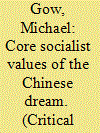

|
|
|
|
|
| Summary/Abstract |
This article analyzes the Chinese Communist Party’s “Core Socialist Values” (shèhuì zhŭyì héxīn jiàzhíguān) to show how each of these twelve values is defined, both independently and in relation to others. Using a Gramscian analytical approach, the article examines how a Chinese “integral state” is being prepared to ensure that consensus to the state’s proscribed values is not undermined by competing discourses. Consideration is given to how civil society becomes the ground for building consensus, reinforced by coercive strategies emanating from the Chinese state. In conclusion, the paper argues that the Core Socialist Values campaign represents a shift in focus under the current Xi Jinping Administration to emphasize the superstructure over the economic base, with the objective of creating citizens of and for the People’s Republic of China.
|
|
|
|
|
|
|
|
|
|
|
|
|
|
|
|
| 20 |
ID:
188864
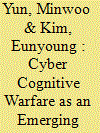

|
|
|
|
|
| Summary/Abstract |
Cognitive warfare has become the crucial war domain that determines the outcome
of modern wars. Joseph Nye pointed out, “in today’s war, it is not whose army
wins, but whose story wins,” emphasizing the importance of narratives to occupy
human minds and hearts. This has been repeatedly observed in the “War on Terror”
in Afghanistan and Iraq–Syria and the Russia–Ukraine war in 2014 and 2022.
The strategic importance of winning human cognition by the use of non-kinetic
influence operation had been similarly emphasized in the propositions of fifthgeneration warfare and Gerasimov’s suggestions. By recognizing the importance of
cognitive warfare, this paper attempts to address the concept of cognitive warfare
and suggest strategic and tactical principles for its practical operation and use.
The concept of cognitive warfare is still ambiguous, blurring together with related
concepts such as psychological warfare, information warfare, cyberwar, active
measures, and Reflexive Control. Besides, the substantial conceptual differences
between the U.S.–West and Russia have added more confusion. Thus, some
clarification to distinguish the concept of cognitive warfare from other related
terms seems necessary. Meanwhile, neither has there been any concrete proposition
of how cognitive warfare works strategically and tactically. The literature and
earlier reports only introduced various specific effects and techniques of cognitive
operations. Nevertheless, how these effects and techniques are strategically–
tactically integrated and jointly applied for a cohesive cognitive military operation
is yet to be proposed. This paper responds to two such issues of cognitive warfare.
In future warfare, the weight of cognitive warfare is anticipated to increase further.
Hopefully, this paper will be a stepping stone to rouse interest in cognitive warfare
and the development of its strategies and tactics.
|
|
|
|
|
|
|
|
|
|
|
|
|
|
|
|
|
|
|
|
|